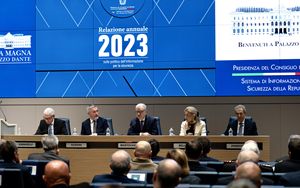(Finance) – “In 2024, 76 countries in the world, equal to half the world population, will vote and there are risks of interference and conditioning of the electoral processes through the hybrid threat”. This is what the director of Dis, Elisabetta Belloni, during presentation of the “Report on information policy for security” relating to the year 2023, edited by the Information System for the Security of the Republic. The report was illustrated today at the services headquarters in Piazza Dante in the presence of the Authority delegated to the security of the Republic, Alfredo Mantovano, of the directors of the agencies, Elisabetta Belloni (Dis), Giovanni Caravelli (Aise) e Mario Parente (Aisi) and the president of Copasir, Lorenzo Guerini.
Russia – we read in the report – is the most active country (followed by China) in hybrid campaigns
“to the detriment of Italy and the entire West”, through espionage, cyber attacks, disinformation, destabilizing exploitation of migratory flows. Moscow has also tried to hinder Italian and European initiatives for energy diversification and the introduction of the price cap on Russian gas with propaganda “aimed at polluting information for the general public about the trend in energy prices”. The intelligence’s attention is now turned to the upcoming events that will catalyze disinformation campaigns: the European elections in June, the Italian presidency of the G7, the exit from the Silk Road.
“In the pro-Russian social channels there was an attempt to support the idea that the tractor protest derived from Italy’s support for Ukraine. The task of the intelligence – he underlined Mantua – it must not be and never will be to control the contents and ideas published online; what the services focus on is the verification of the genuineness and traceability of information online and above all of the truthfulness of social profiles, the dynamics of content creation without distortions by actors who have the objectives of destabilizing information and democratic processes. From this perspective – he added – I hope that in the campaign for the European elections we never lose sight of the profound sense of common belonging to our nation”.
“Intelligence also has the task of analyzing challenges in terms of opportunities to maintain competitiveness in the international context – he added Belloni –. And since national security is the result of a series of interconnected factors which must be analyzed and summarized to allow the government to make appropriate choices” it should be remembered that in recent years “international trade has slowed down” with the “continuing decrease in free trade. We have witnessed – added Belloni – the restriction in trade, due to Covid, the effects of climate change, the crises from the Middle East to Ukraine, and cyber attacks. All destabilizing factors that are part of the transformation of globalization.”
“In the dossier that will be released – he explained Belloni – we have tried to respond to the challenges, illustrating a report from which the complexity of the concept of national security should emerge and we have made a choice to make the annual report as usable as possible”. The main crisis areas are Ukraine and the Middle East. From the analysis of the wars – Belloni underlined – “an increasingly heated global competition clearly emerges” from which derives the “reflection to implement de-risking policies which must involve a careful look at the African continent, in the context Mattei Plan”.
“We must give ourselves tools – he hoped Guerini – to seek an effective reaction to disinformation, taking into account the need not to censor, but also considering that there are places of attack in the formation of our public opinions”. Overall, however, the report reassures, “Italy and, more generally, Western countries continue to demonstrate a good level of resilience both with respect to the conditioning of public opinion and on the economic side and the protection of strategic assets”.
